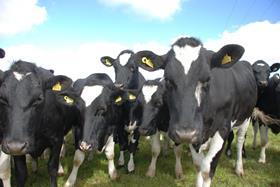
For Charles Richards, becoming a mixed farmer wasn’t a decision he had to make. His business, Splattenridden Farm in south west Cornwall, has produced vegetables and dairy cows for four generations, partly due to the area’s milder climate that makes it easier to produce grass as feed, as well as other crops. But despite the family tradition, the impact of a mixed farming system on improved soil health, less pest pressure and healthier crops is something Richards says he discovered all over again by himself.
The farm now has a 300-cow dairy unit and produces field vegetables, including 200 acres of cauliflower, supplied to Staples in Lincolnshire, 250 acres of crisping potatoes that are sent to Walkers in Leicester and 30 acres of asparagus that go to local markets and packers. Milk produced by the farm goes to Cathedral Cheddar, located about one hour north of the farm, because they prefer higher butter fat content, which is generally produced by grass-fed cows.
“We farm 1,300 acres of land, owning just under 1,000 acres and renting the rest. I personally think our land is healthier. It’s quite a good way of telling the difference,” says Richards. “I didn’t make the decision to go down the mixed farming route, but I see the impact and why we need to keep at it. We have overall better crops, lower disease pressure, easier working soils, and lower fertiliser costs.”
As well as the more obvious physical benefits, Richards has recently begun monitoring soil organic matter on his land, which were found to be high. “We’ve also started looking at the micro organisms in the soil. Everything starts there, with the flora and fauna in the soil,” he says.
“I’ve always been interested in nature. I realised how important it is. We use all these inputs, but if the building blocks aren’t correct to start with you waste your money.”
Clearly someone with a personal interest in soil biology – he also cites crop nutrition and sustainability writer Graham Sait as an inspiration – Richards, who is 34, also believes the younger generation of farmers are more clued up.
Key to the system at Splattenridden is a robust rotation of eight crops, including the new addition of red clover as a fixed nitrogen cover crop to help prevent soil erosion, and grass, which Richards says is as precious as the cauliflower crop.
It’s a different approach to traditional farming in Cornwall, which has typically been “double cropped”, says Richards, with potatoes harvested in May making way for brassicas and cereals. “That works fine but it is quite a strain on the land. Lots of older farmers don’t see the point [in more environmentally-friendly farming],” he explains.
In some ways, he sees mixed farming as a return to the past, when inputs like pesticides and fertilisers weren’t as readily available, and crop rotation was the sole method of building up nutrients in the soil. “The problem is lots of farmers don’t see it as long term. With synthetic inputs you see the effects within four weeks. Organic inputs take longer,” he says, adding that the last “40-50 years have made us a bit slack” due to the availability and efficacy of chemicals.
Although he says it’s hard to quantify the economic benefits, Richards points out the farm doesn’t get quiet spells, so the efficiency of the machinery is “probably better” and there are no spikes in the workload. “We grow grass nine months a year and can produce milk quite cheaply as a result. You couldn’t do what we do in Suffolk because it’s too cold,” he adds.
In further diversification, in 1999 the business set up its composting business The Green Waste Company, which has since expanded to two sites in Cornwall and collects green waste from local authorities, composts it and then uses it on the land to increase nutrient content. The farm also generates its own energy through a combination of wind and solar.
Although he is a strong advocate for farmers working alongside the environment, Richards is doubtful of organic’s ability to compete with conventional yields and produce efficient returns for his business. Instead, he believes mixed farming will become popular as a more “holistic” approach, and one that he believes has clear benefits. “We need a more holistic approach. I personally think mixed farming will grow. I’ve seen a difference in my short farming career.”
With a recycling subsidiary and an impressive roster of high-profile customers for its full range of products, Splattenridden is already well on its way to becoming a holistic farm and one that is certainly prepared for a range of different futures.



